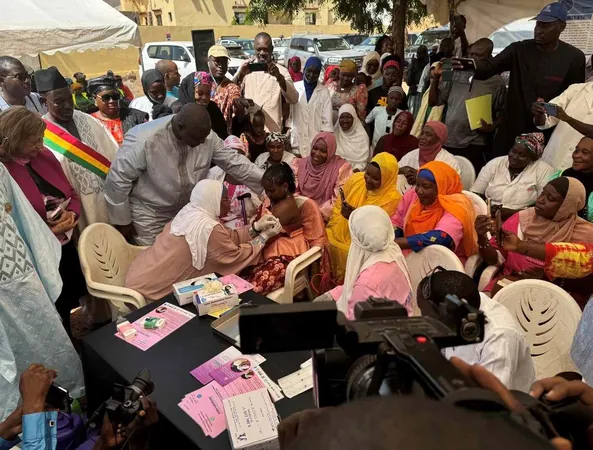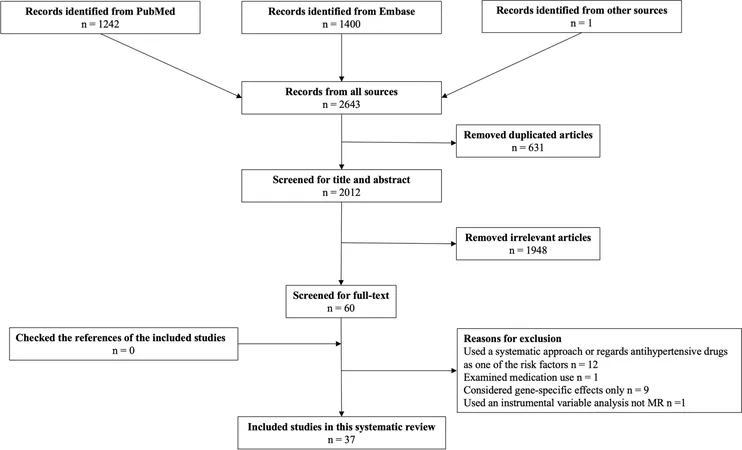
Mali Pioneers HPV Vaccination to Combat Cervical Cancer – A Life-Saving Initiative for Young Girls!
2024-11-21
Author: Wei Ling
Mali Pioneers HPV Vaccination to Combat Cervical Cancer – A Life-Saving Initiative for Young Girls!
In a groundbreaking development for women's health, Mali has officially added the human papillomavirus (HPV) vaccine to its routine immunisation programme. This monumental event took place during a ceremony in Bamako earlier this month, where esteemed dignitaries and international partners gathered to witness a shared commitment to preventing cervical cancer among women in Mali.
Cervical cancer has long posed a severe threat to many women across the nation. One such survivor is thirty-eight-year-old Fatoumata, whose life was severely impacted by the illness. “I spent between 5 and 6 million CFA francs [about US$8,000–9,600] on treatment, with the operation alone costing 2 million [approximately US$3,200],” she shared, illustrating the profound personal and financial toll of battling this disease.
A National Health Initiative with Big Goals
Thanks to support from the global health partnership Gavi, along with co-funding from the Malian government, the HPV vaccine is now provided free of charge to young girls. The ambitious goal is to vaccinate over 320,000 girls annually, with the potential to reduce cervical cancer cases by a staggering 90%. This could mean saving over 3,600 lives each year.
Dr. Ibrahima Diarra, Director of Mali's National Immunisation Centre, stated, “A single dose is enough to protect a ten-year-old girl for over ten years against the viruses responsible for 70% of cervical cancers.” This emphasizes the crucial timing of the vaccine, which is aimed at pre-teen girls to ensure maximum efficacy.
Addressing a Major Public Health Crisis
Cervical cancer is predominantly caused by persistent HPV infection and remains the second most common cancer in Malian women aged 15 to 44. Tragically, many cases are diagnosed at advanced stages, leading to thousands of preventable deaths annually. Compounding the problem are cultural stigmas that often prevent women from seeking medical help. Some women believe that cervical cancer is a curse, further delaying diagnosis and proper treatment.
“Cervical cancer is sometimes viewed as a curse cast by a co-wife, sister-in-law, or former partner,” explained a sexual and reproductive health activist. Such misconceptions hinder efforts to address and combat this critical health issue.
A Step Toward Health Equity
This new vaccination programme is a significant advancement towards health equity in Mali. In low-income countries, cervical cancer deaths make up a considerable portion of the global total; in 2022 alone, 348,000 deaths were reported, with 90% in poorer regions. The rollout of the HPV vaccine ensures that prevention measures are accessible to all girls, irrespective of their geographical location or economic background.
By prioritizing the vaccination of young girls aged 9-14—a strategy endorsed by the World Health Organization—Mali is asserting itself as a leader in cervical cancer prevention. The introduction of this vaccine not only has the potential to significantly decrease the incidence of cervical cancer but also alleviates the hefty costs associated with its treatment.
As one of the first nations in the Sahel region to integrate this life-saving jab into routine health practices, Mali is setting a powerful precedent for its neighbors. This vaccination initiative is a critical component of Gavi’s objective to immunize 86 million girls in low- and middle-income countries by 2025.
In conclusion, Mali's proactive stance against cervical cancer through the HPV vaccine represents hope and progress, creating a healthier and more equitable future for its young women. A monumental step for individual health and a beacon for other nations to follow!




 Brasil (PT)
Brasil (PT)
 Canada (EN)
Canada (EN)
 Chile (ES)
Chile (ES)
 España (ES)
España (ES)
 France (FR)
France (FR)
 Hong Kong (EN)
Hong Kong (EN)
 Italia (IT)
Italia (IT)
 日本 (JA)
日本 (JA)
 Magyarország (HU)
Magyarország (HU)
 Norge (NO)
Norge (NO)
 Polska (PL)
Polska (PL)
 Schweiz (DE)
Schweiz (DE)
 Singapore (EN)
Singapore (EN)
 Sverige (SV)
Sverige (SV)
 Suomi (FI)
Suomi (FI)
 Türkiye (TR)
Türkiye (TR)